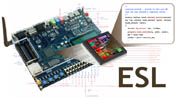Research
Our research deals with the design of embedded computing and communication systems and their underlying
hardware and software technologies.
Energy-efficient and adaptive AI systems: Power and efficiency are critical design concerns across a wide range of
platforms, from tiny IoT devices to large-scale cyber-physical systems. Our work explores hardware–software co-design
of system architectures, approximation techniques, and adaptive execution strategies that significantly reduce energy
consumption while maintaining high accuracy. Recent projects include ECO, a context-aware multimodal AI framework
for NPUs, and XAMBA, which enables efficient state-space models on resource-constrained accelerators.
Battery-free and energy-harvesting embedded platforms: Energy harvesting opens the door to sustainable and perpetual
system operation but requires carefully balancing energy availability and workload execution. We investigate novel
computing paradigms such as processing-in-sensor and processing-in-memory that eliminate costly data movement
and enable AI in battery-free devices. Our PRISM framework demonstrates how these architectures support
energy-efficient AIoT in intermittently powered systems.
Efficient machine learning on NPUs: As emerging models such as graph neural networks and state-space models gain
traction, their deployment on resource-constrained neural processing units requires new techniques. Our work, including
GraNNite and XAMBA, develops high-performance execution frameworks for such models under strict compute and
memory budgets.
Collaborative and distributed inference: Modern embedded systems often operate as part of a network of devices.
We design multisystem approximation techniques that enable devices to jointly execute AI workloads, trading off
accuracy, robustness, and energy efficiency in a coordinated manner.
Secure and reliable embedded systems: Reliability and security are vital in autonomous and connected platforms.
Our SecuPilot project integrates a dedicated security coprocessor for UAVs, ensuring trustworthy and efficient
operation. We continue to explore secure-by-design architectures and system-level reliability for next-generation
embedded intelligence.

